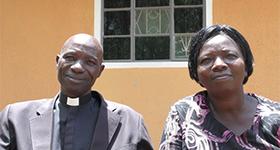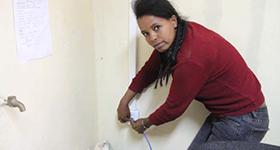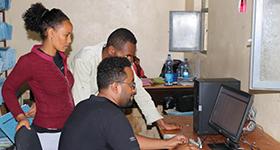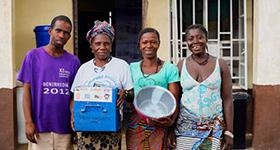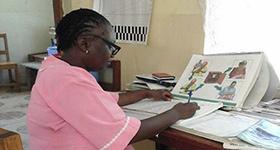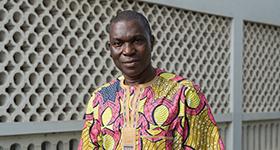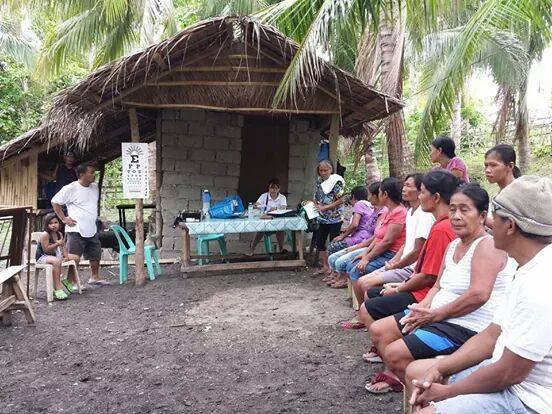
Photo: Patients waiting for vision screenings in San Andres in Quezon Province
Background
Physicians for Peace expanded the reach of their existing vision care program to elementary school children and indigenous Filipinos in underserved areas throughout the Philippines. The vast geographical spread project activities combined with the successful coordination and execution was a notable achievement. Countless individuals who attended the screenings remarked that they had never had their vision checked, much less received corrective services, and expressed tremendous gratitude for the opportunity to receive such treatment that may allow them to return to their studies, work and productivity.
In addition, at each of these large community-based screening locations, the volunteer optometrists provided education regarding vision health and vision care to community health workers, caregivers, patients and community members. These information sessions were very well received and provided an excellent opportunity to reinforce messages about prevention of blindness, particularly for children within the communities.
There continue to be numerous stories that speak to the successes and influence of this project. It is essential to share the perspectives of those closest to the project and most instrumental in the execution of the activities: the volunteer Filipino optometrists.
One such account is told by Dr. Maricris Lim, one of the tirelessly dedicated individuals that assists with outreach activities throughout the country and also serves as an optometrist at one of the vision care clinics.
Intervention
Our destination was the rural town of San Andres in Quezon Province which is approximately 305 kilometers from Manila. The fishing town lies on the shoreline at the tip of Quezon province and is just a few kilometers away from the Bicol region. The villagers’ livelihood is mainly fishing and farming. Being a 4th class municipality with a population of 33,000, the likelihood that a good number of the people have limited access to eye check-up is certain.
The village head (Barangay Captain) welcomed our group. The crowd of village members waited outside his house as more and more people began to arrive. Without a doubt, a good number of them walked a kilometer or two in hopes of receiving a cure to their eyes concerns. Since the crowd multiplied in number, we had to assemble our equipment outside the chief’s home. We had to improvise and make do with the site which was a bit muddy. The Snellen eye chart was hung onto a coconut tree trunk. Our movements on the wobbly chair positioned on unstable ground were limited to maintain our balance. Still we managed to do the eye check-ups and refraction of the people who patiently queued waiting for their turn.
We had to prioritize the senior citizens on this temporary site since it was inconvenient and tiresome for them to travel to the designated screening venue. After almost three hours of vision checkups, we had to transfer to the original screening site where a sizable number of people were patiently waiting to be examined. As important as the eye check-ups are, we always provide lectures to the community on the importance and benefits of basic visual hygiene.
Spending some time with each patient, I began to understand the great need for vision care in many rural areas in our country…In spite of their hardships, the people had always permanent smiles to share and at all times, were gracious and grateful. I recall the 82-year old lady admitting who had no money to pay for the check up and more so for the prescription eyeglass. It was the first time for her to have her eyes checked. She must have spent a big part of her life barely being able to see. This woman, as well as the 271 patients we treated who may have not seen the world as clearly as they want, was finally given the gift of vision, gratefully leaving their words of gratitude with abundant smiles for our help. As the sun set and darkness begun to envelop our mission area, we were happy to have accomplished what the people of San Andres hope for; the relief of their eye problems which they endured for years. They are now more fit to resume their daily activities and live a normal and productive life.

